My gelding Khami inspired me to write this blog. But he’s not the only one: there are others I have worked with over the past years who are like him in one way or another.
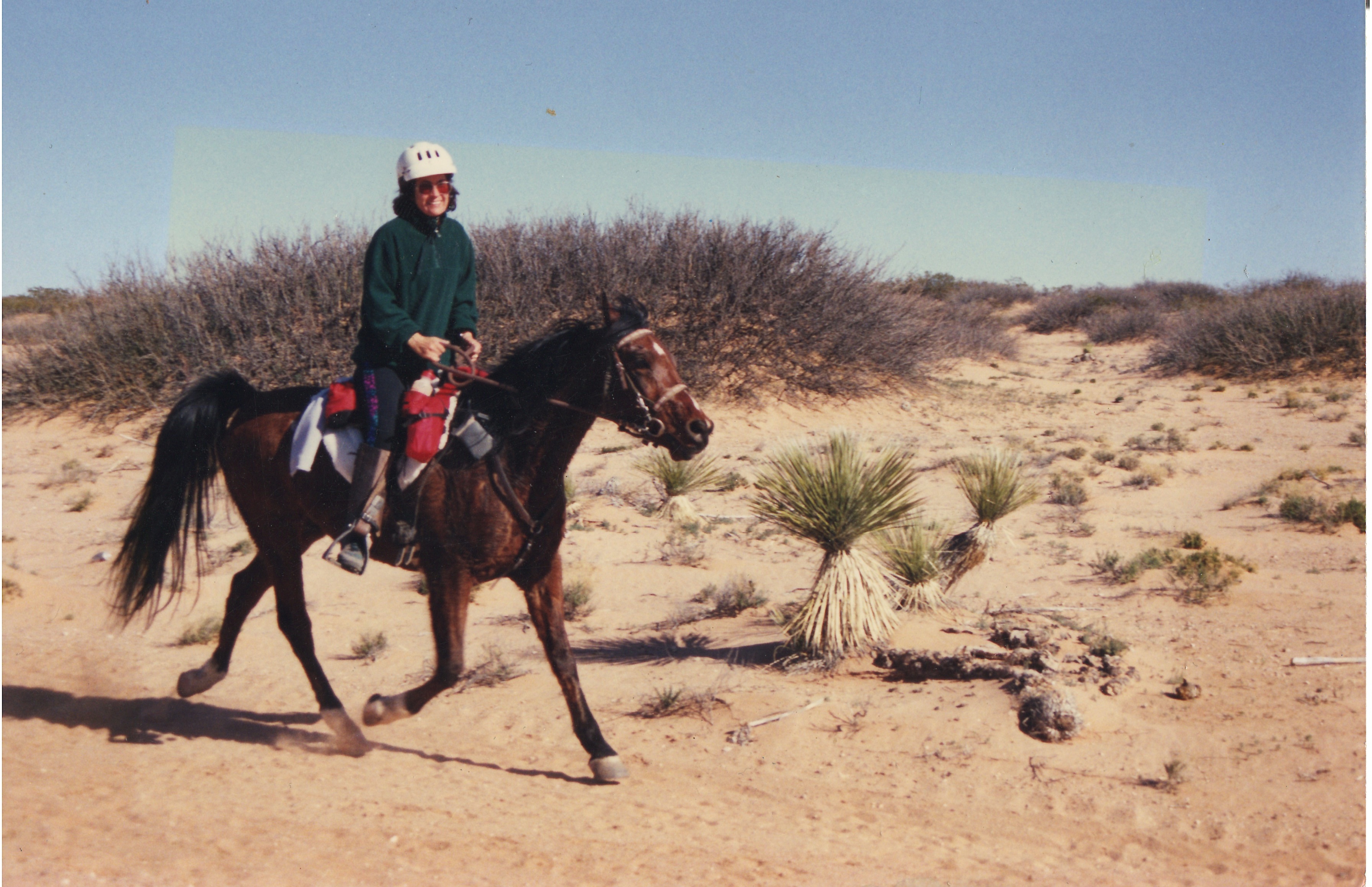 These horses are accustomed to having jobs. If they are retired from their jobs, they still consider that they’ve put in their time with training, schooling and their eyes glaze over if you ask them to do something they consider elementary.
These horses are accustomed to having jobs. If they are retired from their jobs, they still consider that they’ve put in their time with training, schooling and their eyes glaze over if you ask them to do something they consider elementary.
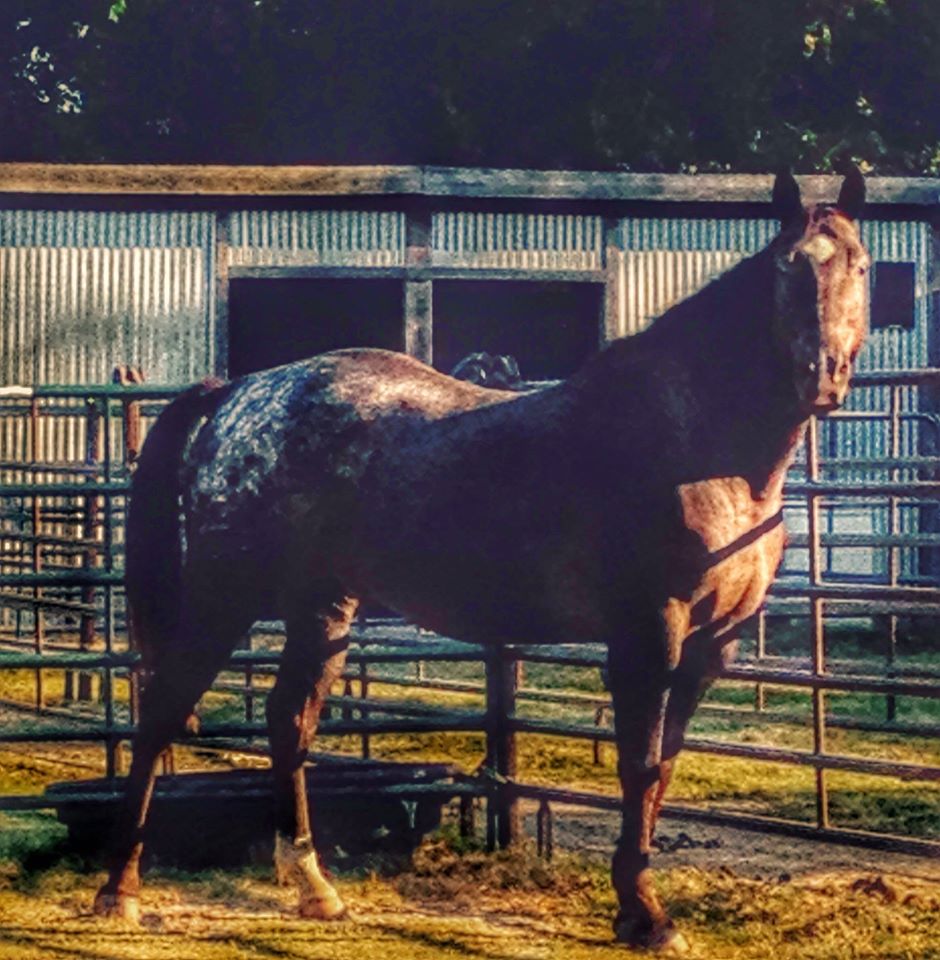
One of my favorite horses, Tex, a former champion racehorse and trail horse who has ridden through several states, came to one of our clinics and did great the first day. He thought, wow, liberty training is okay. You don’t need to do a whole lot. In fact the people even know how to do some things like horses do, like move them around and walk beside them.
On the second day of the clinic, Tex really was ready to go home. He found that staring at a beautiful mare in a nearby corral was loads of fun and we could stand there all day and stare off into space with him. But he wasn’t going to budge.
Khami has been fabulous as a saddle horse, and kid’s riding horse, but there is very little I can interest him in on the ground, except food. When he was younger, he was very much like the horse I write about next, Jack. So we start with food. That’s why the treasure hunt mentioned in last week’s blog is so important for him. Ponying him out on the trail also serves to get two horses some exercise and he gets out to see the sights without carrying a rider.
There are also the horses who have jobs currently who second guess you as to what you want them to do. Oh, sure? step over behind? No problema! I can do that! Oh, you want a shoulder in? Sure, I can do that too!
In liberty training, I don’t want those things, so they are offering them because they are second-guessing my request. They are not accustomed to not being expected to do anything. They’re not sure what the question is. So I get really clear with the question, from the beginning. I get really horse-like. I’m hoping they can switch from thinking of me as a human asking them to do a particular maneuver to another horse who is simply asking them to move over, or walk side by side. I can see the horse’s expectation that he must do something to please.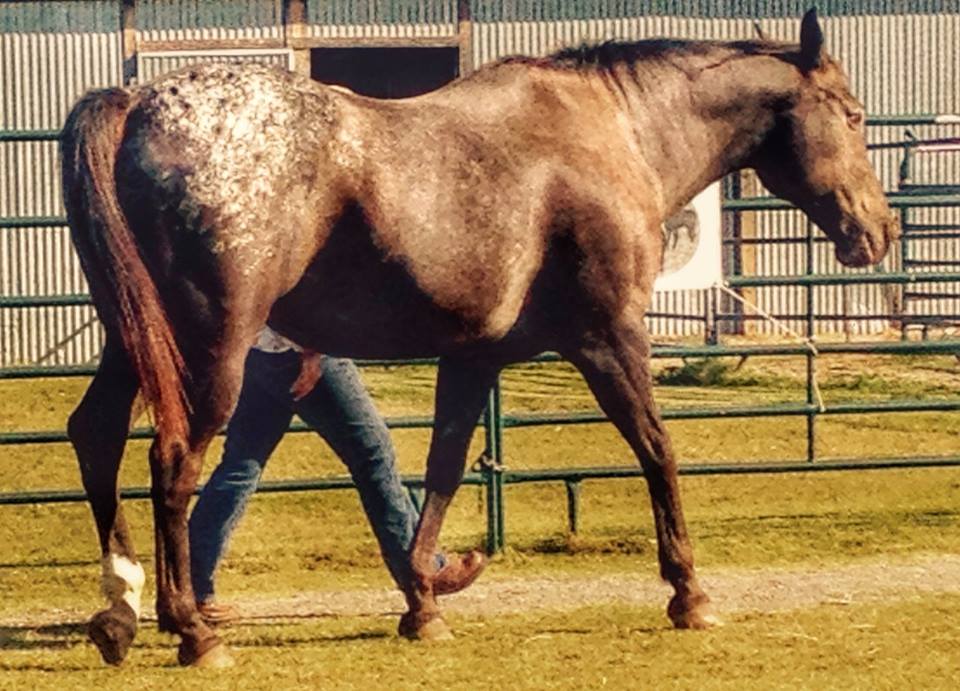
When we have a horse who is done with the activity like Tex, we can either stand there forever or we can put him away and get out another horse. Sometimes, the liberty work is over quickly with a horse like that. He has a long history of doing. It takes awhile for him to develop a sort of “stamina” for the liberty work that’s unlike anything he’s done before with humans. (Don’t get me wrong – Tex’s owner meditates with him and kisses him, and does lots of fun stuff that doesn’t involve work.)
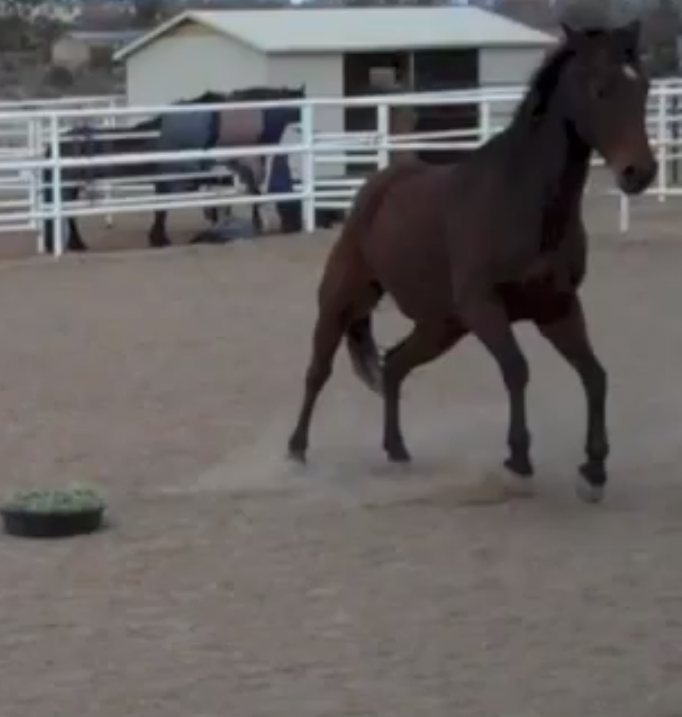
Another clinic horse, Jack, was very talented at reining, cutting, you name it, he could do it. He thought liberty training was lots of fun. He thought I wanted to play with him so he ran and leapt all over the place. The challenge was to get him to engage, but engage fully, not in a doing-what-I-wanted way. His stablemate, Roxy, watched carefully while Jack learned how to walk with me to food and to leave the food. She decided to give a free lunging performance around the food. She figured that by doing that, she could remain close to the food and knew that eventually I would let her eat if she was patient enough. She was not going to do what Jack did – gallop around every time he was moved off food – which to her way of thinking, took up a lot of time. Roxy did everything perfectly, and she had it all planned. When I finally connected up with Roxy, I felt that although she had planned the whole thing from her observation of Jack, she knew what we were trying to accomplish. She embodied it quickly because she had watched, and it was a small step in the direction of a deeper working bond that she could carry over to her owner.
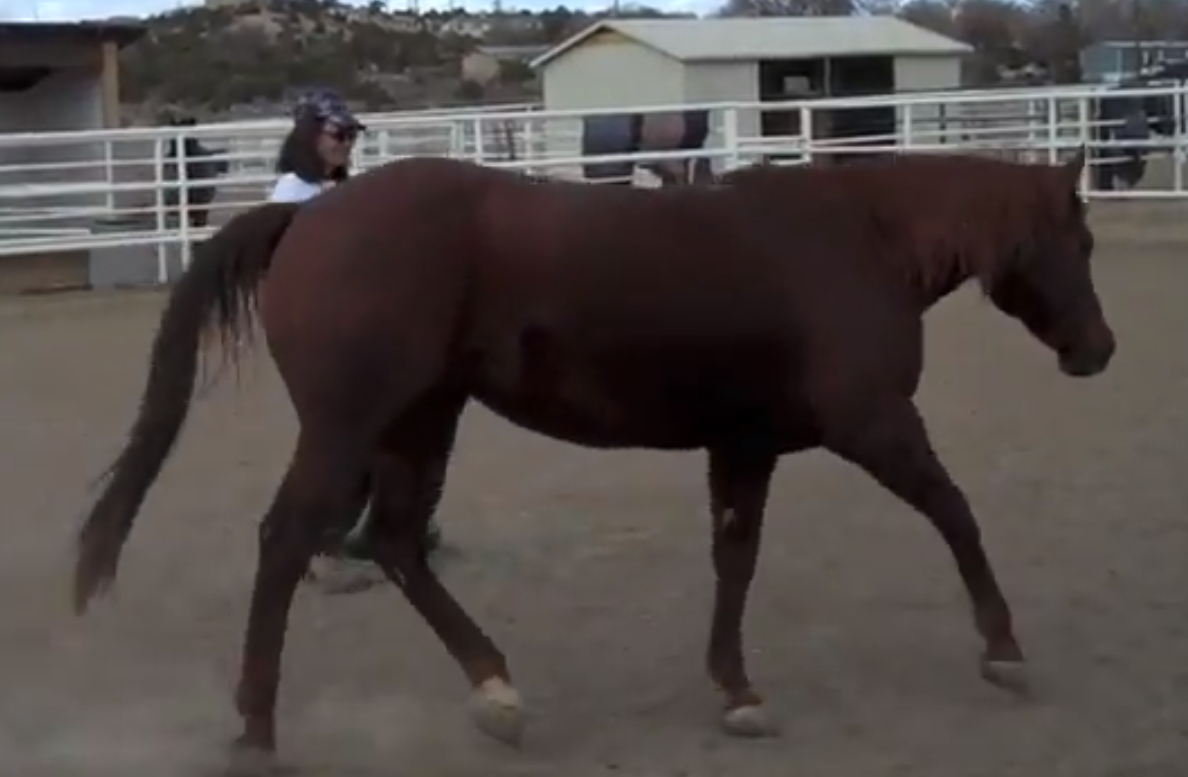
Zoe, a young Morgan show horse, needs her agenda mixed up so that she isn’t doing the same thing every day. Drilling won’t work for her, neither will the same repetitive Liberty Foundations be enough for her. For this type of horse, and also for Tex, Jack, Roxy and my Khami, I suggest
1) mix up riding, lunging and other activities with the Liberty Foundations
2) make the Foundations more creative, after you have the basics on the horse.
For one mare I worked with recently, who had had a lot of natural horsemanship training, her response to the “walking down” exercise was to turn to face her owner. This is interesting because I’m sure she wouldn’t do that if there was a horse moving her from behind! So she had been taught something against what would normally occur in a herd situation.
In a situation like this, I told the owner that you’ve spent a lot on this type of training that must be useful in some settings, but the horse is acting in a rote way and not relating to you as a herdmate. The mare is “well-trained” by our human standards of what we want from a horse. Liberty Foundations are there to develop a relationship, not to train behavior into the horse. So the recipe for this horse was as follows:
1) Visualize the Liberty Foundations as a new way of looking at things.
2) The Liberty Foundations are a paradigm shift for humans, but not so for horses.
3) Intersperse the Foundations in with what you are doing, such as riding, perhaps not doing round pen work on the same day you do the Foundations, so you don’t confuse your horse.
4) Bring the horse to a place where she could enjoy the work she does in a different spirit than she exhibited when she first arrived at the clinic.
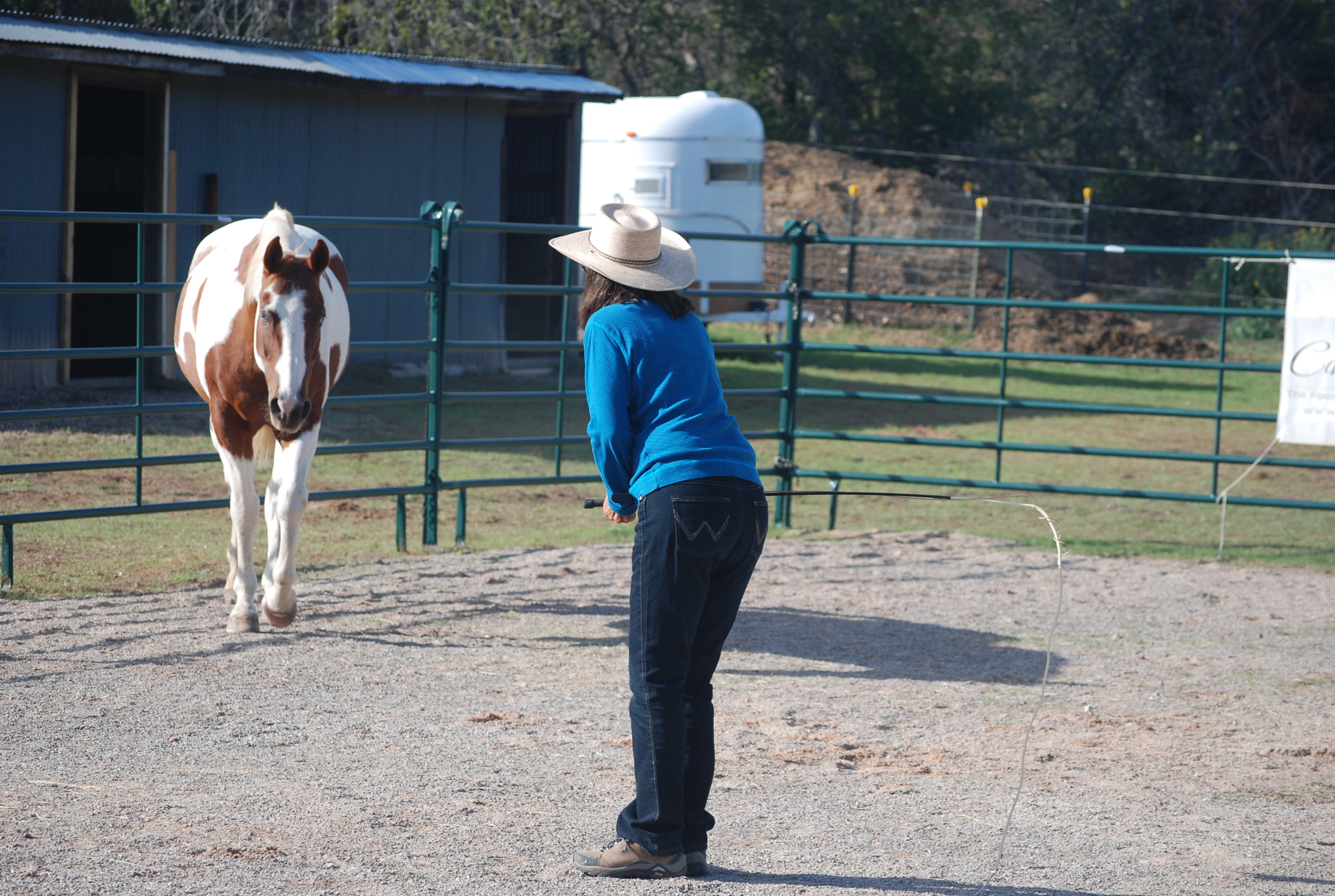 People will say that by virtue of spending time with a horse, you can build a relationship. To a certain extent, that can be true. The horse who is worked with on a daily basis will be better schooled, and you will build something by spending so much time together. But the relationship is built upon what the horse will ultimately be able to do for you. Horses do enjoy doing things with people, if their people are kind and good leaders. We can put all sorts of equipment on them and they will placidly go forward and try to do what we ask. A bond of sorts may be formed this way, and the horse is rewarded for its efforts.
People will say that by virtue of spending time with a horse, you can build a relationship. To a certain extent, that can be true. The horse who is worked with on a daily basis will be better schooled, and you will build something by spending so much time together. But the relationship is built upon what the horse will ultimately be able to do for you. Horses do enjoy doing things with people, if their people are kind and good leaders. We can put all sorts of equipment on them and they will placidly go forward and try to do what we ask. A bond of sorts may be formed this way, and the horse is rewarded for its efforts.
The pride most people take in their horses is based on their performance, not on their ability to stand around in a pasture and eat grass.
What I told another trainer this week is, that the Liberty Foundations have become a way of life for me, and that I intersperse them and some really free work with work under saddle, lunging and other humanly important activities. I try not to work in the same location, and I have different things available to interest my horses.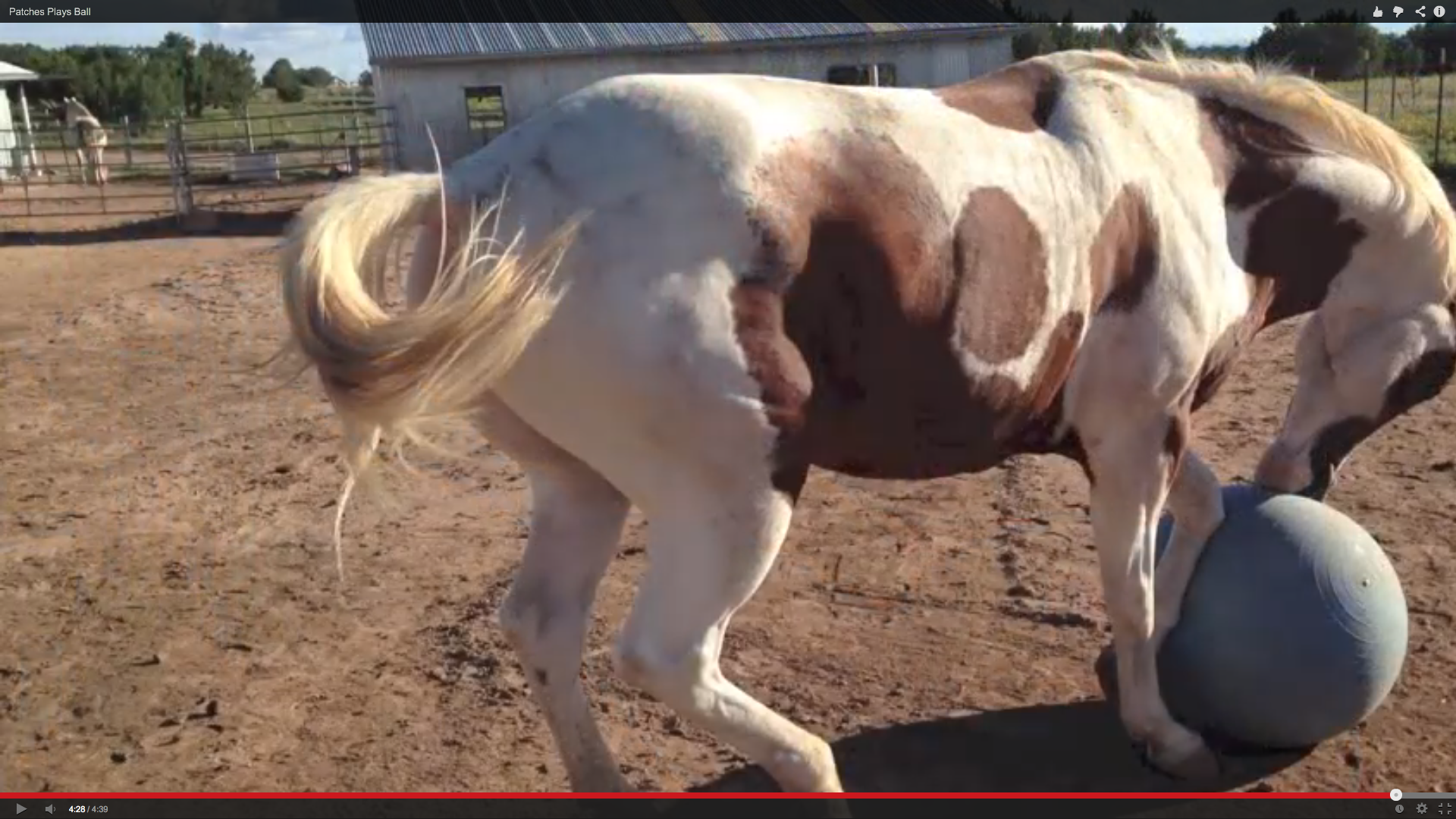
This way I keep the horses engaged and curious about what we will do the next time we work together.
*****
Keep an eye on the calendar as more events will be added as they are planned.
copyright: Susan Smith, OrthoHorse)
Services: Bodywork: (Ortho-Bionomy for people, Equine Ortho-Bionomy, Equine Positional Release (EPR)): private sessions, tutorials, phone consultations, Horse & Rider sessions, distance healing communication and gift certificates
Liberty Coaching: clinics, mini-clinics, workshops, private and semi-private sessions, tutorials, consultations: by appointment: 505.501.2478 or emailing susansmith@orthohorse.info Scheduling now. Contact me for details.
I’m now putting together the 2015 Clinic Calendar. Let me know if you want to do a clinic in your area. Prices will vary according to location.
March/April Clinic in Santa Fe: Stay tuned for dates!
April 10-12 – Spring Liberty Weekend in Oklahoma — Susan Smith and Ruella Yates, co-instructors. Contact either of us: susansmith@orthohorse.info or ruella@libertyfoundations for further details.
September 26-27 – Fall Weekend Liberty Foundations Clinic in Oklahoma — Susan Smith and Ruella Yates, co-instructors. Contact either of us: susansmith@orthohorse.info or ruella@libertyfoundations for further details.
Who will benefit from this work?
All horses and humans, but specifically:
- Horses who have not responded to traditional natural horsesmanship
- Horses who have been frightened, abused and in other ways traumatized
- Horses who may be aggressive or too passive in their herd situations
- Horses who have problems with humans
- All humans who may be puzzled about relationship with horses and want to deepen their connection.
December 7011 Sahaja 2015 5-Day Clinic on the island of St. Vincent in the Caribbean – Susan Smith & Stina Herberg. See details:
Independent Liberty Trainers Network
Susan & Stina Team Up to Make the Sahaja Clinic an Unforgettable Experience
Susan is a member of the Independent Liberty Trainers Network. libertytrainersnetwork.com/



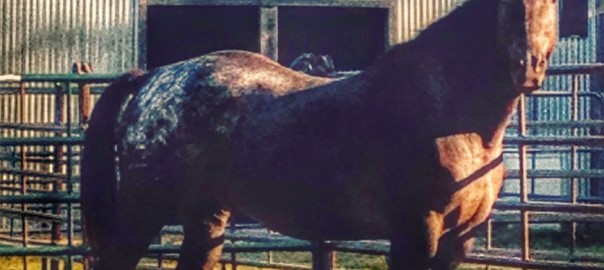
Thanks for another engaging blog post, Susan! I always love your stories of different horses you’ve worked; I feel that I know them personally! Looking forward to teaching with you at our Spring Clinic!
For the Free Horse,
Ruella Yates
Spirit Horse Ranch Liberty Foundations
near Oklahoma City
Me too, Ruella! I always look forward to the new horses and people at our clinics, and what we will all learn.